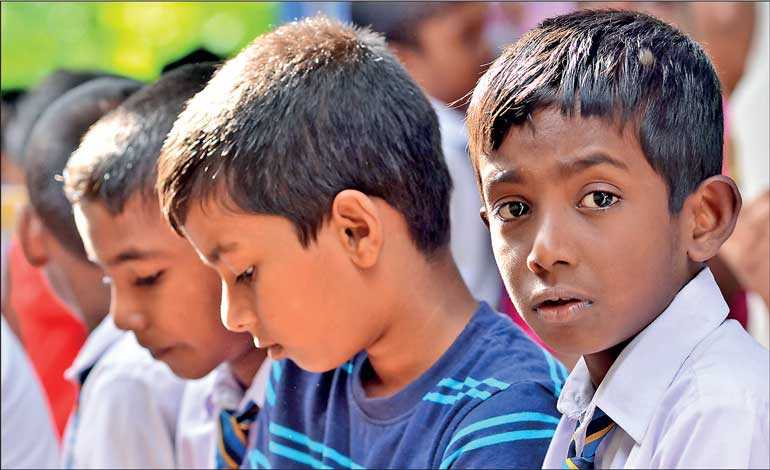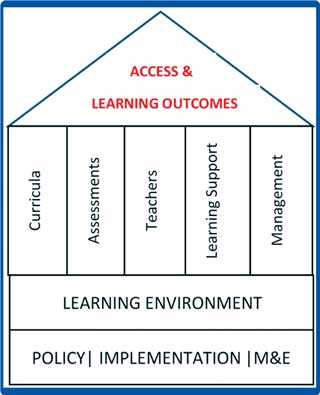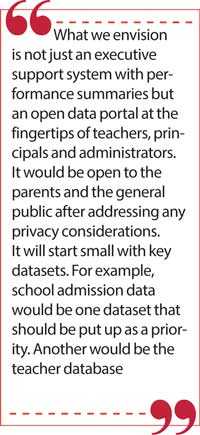Wednesday Feb 18, 2026
Wednesday Feb 18, 2026
Friday, 25 October 2019 00:00 - - {{hitsCtrl.values.hits}}

I write with apologies to Dhammika Perera from whose series on ft.lk I borrowed the ending phrase in my title. It is heartening to see policy engagement by a corporate leader. 
Policy is indeed too important to be left to politicians. But, given the complexity of education issues it is often tempting to come up with a hundred and one things one might do to fix. That is a mistake in my opinion. Unless we identify a few pivotal changes that will lead to positive repercussions across the education sector, we will be lost in detail.
The 2003 National Education Commission (NEC) policy framework listed 122 proposals not counting sub proposals within each. NEC’s 2016 policy document does even better with 154 proposals. Dhammika Perera presents ideas for education under three hypothetical ministries with 60 proposals for the ministry for school education.
In this column I try to distil these various policy proposals, campaign promises of political parties and inputs from well-wishers of www.educationforum.lk to identify three pivotal changes that will create a ripple effect across the education sector. The rest, to quip a certain rabbi, is details.
I find it useful to look at education as a pyramid where the base is comprised of actors and institutions responsible for ‘Policy formulation implementation and monitoring’. The result of their activities is the ‘Learning Environment’ consisting of curricula, assessments, teachers, learning support and management systems. At the pinnacle are opportunities for ‘Access’ and the quality of ‘Learning Outcomes’. The model can apply equally well to post-secondary education or early childhood education, but the focus here is school education from primary to secondary grades.
Burning issues in education
While revitalising the Education Forum Sri Lanka, a platform that has been in existence since 2005, we asked more than 30 people comprising of individuals who have contributed to education in different ways to tell us the first three burning issues that come to mind. Aligning their responses with the three layers of the education pyramid we came up with a succinct set of issues pertaining to school education; namely:
Access: Unhealthy competition for admission to popular schools.
Learning Outcomes: An exam-centric approach which does not prepare students for life.
Learning Environment: Joy of learning has disappeared from all stages of education; school day is taken up almost 100% preparing for exams. No room for active learning that gives intra-personal, inter-personal, citizenship or media and ICT literacy competencies (Curricula column). Success is measured by success in paper and pencil examinations; ways to assess transversal competencies are needed (Assessments column); teachers have become meek followers when they should be innovators; not enough teachers with adequate ICT or English competency (Teacher column); disparities in  infrastructure, materials and human resource across the school system (Learning Support column); management is archaic and not teacher-friendly (Management system Column);
infrastructure, materials and human resource across the school system (Learning Support column); management is archaic and not teacher-friendly (Management system Column);
Policy Formulation, Implementation, and Monitoring and Evaluation: Politicisation, Lack of motivation and Poor coordination within the system.
Of these issues, the problems pertaining to policy formulation, implementation and M&E are fundamental. As the National Education Commission (NEC) noted poignantly in 2003, three underlying issues have contributed to dysfunction in the Sri Lankan education system over the years. Namely, (1) Extreme politicisation (2) Corruption and or indifference of the bureaucracy, the leaders, and teachers of educational institutions and (3) Lack of coordination between the multiple actors and institutions, especially between national and state entities.
By all accounts the situation has not changed much. Unless the responsibilities of authorities are clearly delineated and performance standards to each assigned, say, by the Sectoral Committee for Education in the Parliament, the actors and institutions in the sector will continue to be a break on the education of our children. Therefore, one ministry of education with clearly assigned responsibilities to the ministry and affiliated agencies is a must. It is not inconceivable because when faced with limits on cabinet size higher education and technical and vocational education gets tossed around like the least favourite candy in the jar.
Secondly, only what is measured gets done. What is not measured does not get done. Since it is only exam results that count, the examination system affects everything else about education. Unless we change the practice of using only examination results for assessing students, no amount of money or effort will change the teaching learning process.
Thirdly, the best antidote to corruption and/or indifference and addressing disparities is open government. Therefore, my third suggestion is an open data system for education beginning with school data by student, class, by subject and by teacher.
To elaborate on the three pivotal reforms:
One Ministry of Education for policy making and monitoring, with implementation by others
Here I would settle for two ministries, if we must. One for Early Childhood, Primary and Secondary and another for Post-secondary education. However let us assume for now that we can indeed have one Ministry of Education as is the practice in most countries in the world (except a few like Malaysia where they have a separate ministry for higher education). As I understand, Sri Lanka is the only country where we have three ministries for three subjects and dump higher education with random subjects like highways or water.
Education is a devolved subject. The ministry should gradually relieve itself of implementation tasks and retool itself to become a policy shop and an inspectorate, and that only. The ministry would achieve much more by creating a productive rivalry between the provinces while allowing them to innovate. Monitoring and rewarding provinces for performance would be the ministry’s main function. All  education-related Commissions, National Institute of Education and the Department of Examination would operate under the ministry. The Parliamentary Sectoral Committee on Education should be alert to any duplication of efforts costing tax payer money and causing dysfunction.
education-related Commissions, National Institute of Education and the Department of Examination would operate under the ministry. The Parliamentary Sectoral Committee on Education should be alert to any duplication of efforts costing tax payer money and causing dysfunction.
An Assessment Framework that includes 21st century competencies
Currently students spend almost 100% of their time preparing for exams. The NEC and various expert committees have stressed the need to reduce the number of subject-wise examinations faced by a student and allow other subjects to be examination-free with project-based active learning that integrates transversal competencies and STEAM. Integrating Science-Technology-Arts-Engineering-Mathematics or STEAM thinking across the curriculum is now considered an essential part of education. More on this important topic later.
Dashboard with Open Data Portal on school facilities, teachers and students
If I were to choose one out of these three pivotal reforms, the ‘Open Data Portal’ would be my pick. Having data on students, teachers and facilities at the click of a button is not overly difficult to achieve if it is made a priority, but it will be a game changer. Here I should note that Dhammika Perera’s proposal Number 24 presents something similar – i.e. “Create a portal to monitor the quality of the district level school education system. The portal includes general school statistics (no. of schools, no. of teachers, and no. of students, both urban and rural) and a performance dashboard (dropout rate, schools with functional toilets, schools with drinking water, etc.”
What we envision is not just an executive support system with performance summaries but an open data portal at the fingertips of teachers, principals and administrators. It would be open to the parents and the general public after addressing any privacy considerations. It will start small with key datasets. For example, school admission data would be one dataset that should be put up as a priority. Another would be the teacher database.
Let me illustrate latter with an example. A Facebook friend of mine is qualified to teach A/L science, but after 10 or so years of service, her mandatory transfer was to a primary school because the zonal director could not find anything else within the zone. Our education silos are such that transfers are not easily possibly across silos.
Meanwhile across the country, children are idling due to, say lack of a teacher for A/L science. If school census data show the subjects covered, the teacher responsible, the qualifications of the teacher and his/her time in the school, by school and grade, we can achieve more efficiencies and there will be less grief for all concerned.
If a teacher is looking for a mutually beneficial transfer to a different school zone that too can be indicated in the dataset. If such a portal existed, my teacher friend herself would find an appropriate mutual transfer, or a principal from another school would discover her and make the request to officials and the officials can do the approvals online. This is only one example. Possibilities are endless.